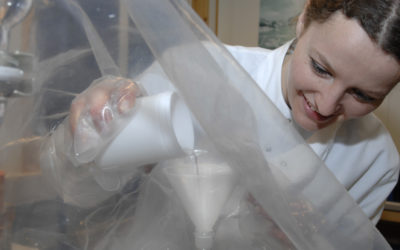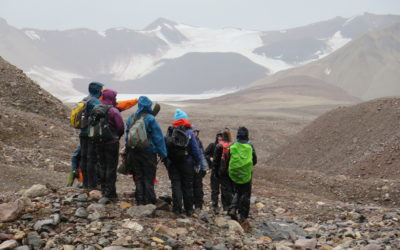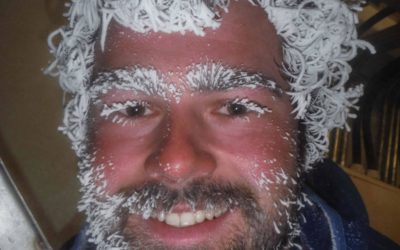
NERC Doctoral Training Partnerships
Discover more about PhD opportunities with British Antarctic Survey.
There are currently over 100 PhD students associated with our organisation and nearly half of these students work full time at our offices and labs in Cambridge. Students have full access to our state of the art research facilities and some have the opportunity to carry out research in the polar regions. We strongly encourage the pursuit of interdisciplinary projects, and there is the opportunity to work with teams at the forefront of global change and exploration science in both polar regions.
Since 2014 our studentships have been funded through NERC Doctoral Training Partnerships (DTPs) and Centres for Doctoral Training (CDTs). From 2025, DTPs and CDTs will be replaced by NERC Doctoral Landscape Awards (DLAs) and Doctoral Focal Awards (DFAs).
We are delighted that our partnerships will continue in the new era of DLAs, namely ARIES, CREATES, GW4+ Doctoral Training Landscape Partnership (DLTP), Iapetus and IGNITE.
Here are the BAS projects or supervisor research areas within our DLA partnerships for 2025. Each partner has a separate application process, which is often through the university at which the project is linked. Please read and follow the instructions carefully before applying to ensure your application can be fully considered. More information can be found on each of the DLAs’ websites.
Exceptionally, we may have opportunities funded through other sources. These projects will be advertised below as and when they are available.
If you would like to know more about applying for a PhD, here are some short videos on Preparing your application, Tips on meeting your potential supervisor and Preparing for a PhD interview and presentation
INSPIRE DTP also have some Top Tips and Student Testimonies for prospective students for more insight into PhDs
Equality, Diversity & Inclusion – We are fully committed to the UKRI EDI principles and policies. We strive to recruit and support a diverse and inclusive cohort of students.
Eligibility: UK students will be eligible for a full NERC studentship. More information is available in the UKRI Training Grant Guide. A full studentship will include the cost of fees, stipend, and research funding allowance. DLAs may have funding for only a very limited number of international students.
Projects or supervisor research areas starting October 2025 are listed below.
Closing date for applications: Monday, 17th March 2025.
Applications for 2025 have now closed.
How to apply: Enquiries in the first instance should be made to the BAS supervisor. To apply, please follow the instructions on the ARIES website.
Applications for 2025 have now closed.
Browse the list of topics and supervisors to find those that particularly interest you. Finalised project titles are not listed as the intention is that you express interest in a topic and develop the final project with your supervisory team in the first term of your studies. You are strongly advised to contact prospective supervisors before applying, to further explore your mutual interests and get additional advice and information. Further information on how to apply can be found on the CREATES website.
BAS supervisors looking to develop projects are listed below.
Applications for 2025 have now closed.
How to apply: Specific information is contained under each project – please ensure you follow the instructions carefully so that your application can be considered.
To submit an application, you will need to apply via the University of Bristol application page as the registered university for the project. It is important that you follow the detailed instructions provided when applying for the project and be sure to read the prospectus carefully. We advise you download the ‘Admissions Statement’ for Physical Geography from the prospectus and follow the instructions. When applying please include in your application the NERC GW4+ DLTP personal statement (Office document, 194kB) version of a personal statement. There is an additional ‘applicants questionnaire‘ that the DLTP require, so please complete this at the time of application as well. When applying for projects in the School of Geographical Sciences please choose ‘Geography- PhD’ in the ‘find a programme’ box.
To submit an application, you will need to apply via the University of Bristol application page as the registered university for the project. It is important that you follow the detailed instructions provided when applying for the project and be sure to read the prospectus carefully. We advise you download the ‘Admissions Statement’ for Bristol and follow the instructions. When applying please include in your application the NERC GW4+ DLTP personal statement (Office document, 194kB) version of a personal statement. There is an additional ‘applicants questionnaire‘ that the DLTP require, so please complete this at the time of application as well. When applying for projects in the School of Earth Sciences please choose ‘Geology- PhD’ in the ‘find a programme’ box.
Applications for 2025 have now closed.
How to apply: In the first instance please contact the BAS supervisor if you have any questions about the research project. Full guidance on how to submit an application can be found on the Iapetus website.
Applications for 2025 have now closed.
How to apply: In the first instance please contact the BAS supervisor if you have any questions about the research project. Full guidance on how to submit an application can be found on the IGNITE website.

Discover more about PhD opportunities with British Antarctic Survey.

Find out more about our 8-day training course focussing on working safely and effectively in the polar regions. Deadline 13th March 2020.

Science careers video clips